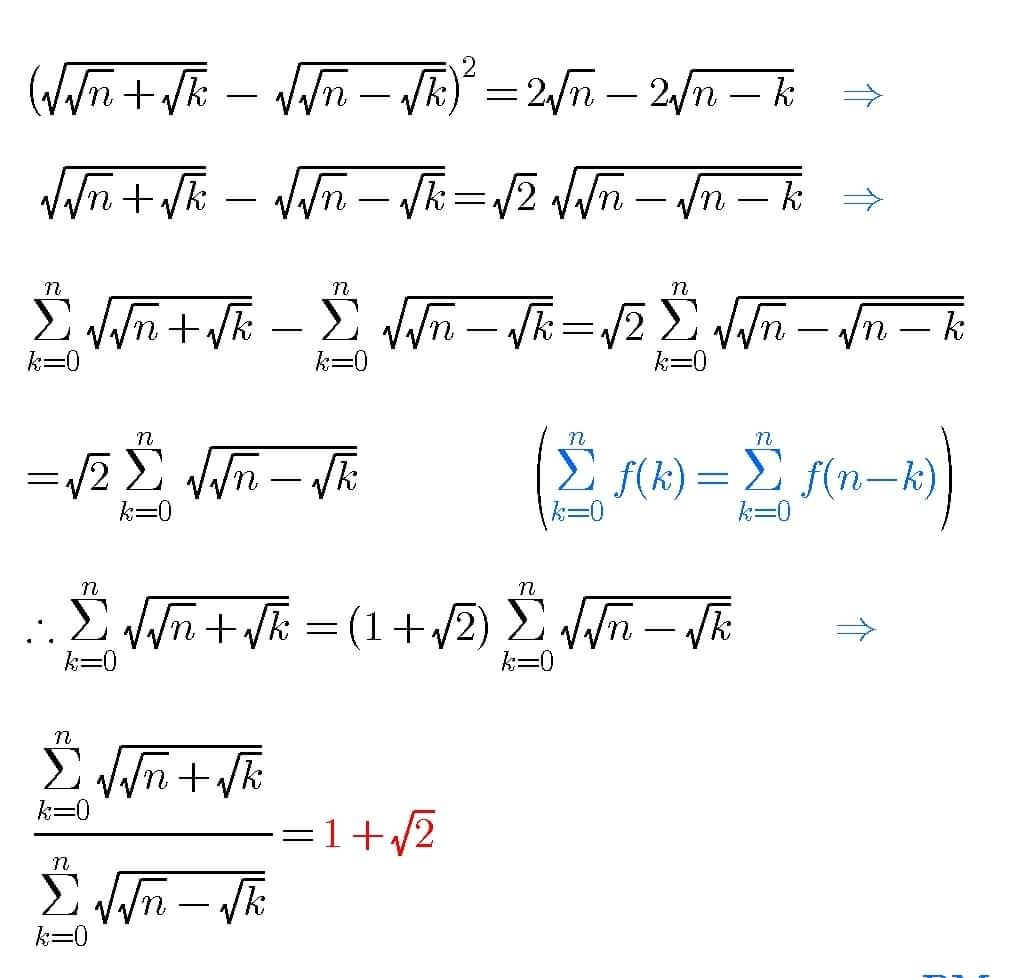
Question and Answers Forum
Question Number 47725 by Meritguide1234 last updated on 14/Nov/18

Commented by Meritguide1234 last updated on 15/Nov/18

Commented by maxmathsup by imad last updated on 15/Nov/18

Answered by maxmathsup by imad last updated on 15/Nov/18
![if the Q. is find lim_(n→+∞) ((Σ_(k=0) ^n (√((√n)+(√k))))/(Σ_(k=0) ^n (√((√n)−(√k))))) let S_n =((Σ_(k=0) ^n (√((√n)+(√k))))/(Σ_(k=0) ^n (√((√n)−(√k))))) we have S_n =((n^(1/4) Σ_(k=0) ^n (√(1+(√(k/n)))))/(n^(1/4) (√(1−(√(k/n)))))) =(((1/n)Σ_(k=0) ^n (√(1+(√(k/n)))))/((1/(n ))Σ_(k=0) ^n (√(1−(√(k/n)))))) so S_n is a Rieman sum and lim_(n→+∞) S_n =((∫_0 ^1 (√(1+(√x)))dx)/(∫_0 ^1 (√(1−(√x)))dx)) let calculate ∫_0 ^1 (√(1+(√x)))dx changement (√(1+(√x)))=t give 1+(√x)=t^2 ⇒(√x)=t^2 −1 ⇒x=(t^2 −1)^2 =t^4 −2t^2 +1 ⇒ dx=4t^3 −4t)dt ⇒∫_0 ^1 (√(1+(√x)))dx =∫_1 ^2 t(4t^3 −4t)dt =4 ∫_1 ^2 (t^4 −t^2 )dt =4[(t^5 /5) −(t^3 /3)]_1 ^2 =4 {(2^5 /5) −(2^3 /3) } =32{ (4/5) −(1/3)} =32.(7/(15)) =((224)/(15)) now let calculate ∫_0 ^1 (√(1−(√x)))dx changement (√(1−(√x)))=t give 1−(√x)=t^2 ⇒(√x)=1−t^2 ⇒ x=(1−t^2 )^2 =t^4 −2t^2 +1 ⇒dx =(4t^3 −4t)dt ⇒ ∫_0 ^1 (√(1−(√x)))dx = −∫_0 ^1 t(4t^3 −4t)dt =−4 ∫_0 ^1 (t^4 −t^2 )dt =4 ∫_0 ^1 (t^2 −t^4 )dt =4[(t^3 /3) −(t^5 /5)]_0 ^1 =4{(1/3) −(1/5)}=4.(2/(15)) =(8/(15)) ⇒ lim_(n→+∞) S_n =((224)/8) =((112)/4) =((56)/2) =28 .](Q47853.png)
Commented by Meritguide1234 last updated on 16/Nov/18

Commented by Meritguide1234 last updated on 16/Nov/18

